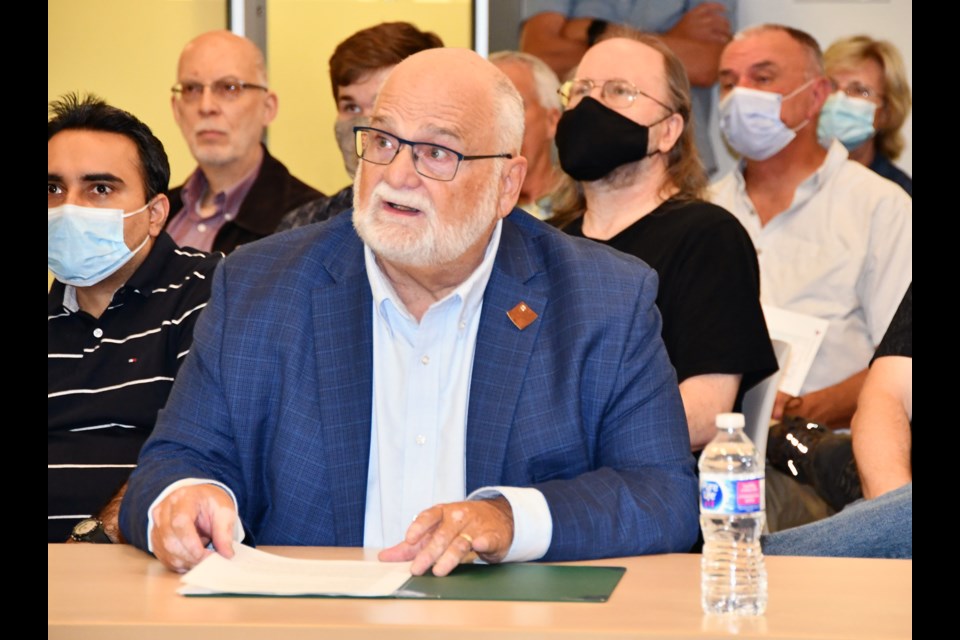A political nightmare.
That’s how Coquitlam–Port Coquitlam MP Ron McKinnon — and every speaker after him — described a proposal for a new federal riding that would see South Port Coquitlam cut off from the rest of the Tri-Cities.
The proposed riding, called Pitt Meadows–Fort Langley, would stretch east from South PoCo and include parts of the municipalities of Surrey, Pitt Meadows, Maple Ridge and Fort Langley.
But the Tri-Cities’ two existing ridings of Coquitlam–PoCo and Port Moody–Coquitlam, currently held by MP Bonita Zarrillo, would largely stay the same, with the former losing South PoCo.
On Tuesday (Sept. 27), those attending the Federal Electoral Boundaries Commission consultation at the Coquitlam Public Library were united in their stance that the Tri-Cities should not be divided federally.
The B.C. commission, made up of Justice Mary Saunders, Kenneth Carty and Stewart Ladyman, is attempting to redraw the lines to accommodate growth in the Lower Mainland/Fraser Valley, which has 26 electoral districts.
The commission is tasked with adding one more riding in the province, from 42 to 43, based on the 2021 Census numbers, to hit around the 116,000-population mark in each district.
Under the proposal, Coquitlam–PoCo would have 114,901 people while PoMo-Coquitlam would have 116,740 and Pitt Meadows–Fort Langley 116,538.
McKinnon said chopping off South PoCo to add it to the Pitt Meadows–Fort Langley riding would be “a real disservice to the people of South PoCo.”
And he urged the commission to keep the city intact and part of the Tri-Cities, offering two alternatives to the redrawing.
He and others spoke passionately about the Tri-Cities as an entity, how the school district follows the Tri-City boundaries and how the name is part of local businesses and organizations.
SD43 board chair and PoCo Trustee Michael Thomas said the commission would be leaving out seven schools if South PoCo is excluded federally.
Thomas and others also spoke about how vital it is to have an MP close by to access federal resources.
“We need the level of attention that we expect from our MP,” Thomas said.
Fritz Radandt, a former riding association president, talked about the difficulty of organizing political campaigns given the number of municipalities in the proposed Pitt Meadows–Fort Langley district.
Lumping together neighbouring communities “with no commonality… is not a natural fit in any way whatsoever,” Radandt said.
Alex Code, the museum manager at PoCo Heritage, which is in South PoCo, said the proposed eastern expansion would run contrary to geographical, cultural and historical lines as PoCo is closer to Coquitlam than cities across the Pitt and Fraser rivers.
“These rivers have a powerful way of shaping our communities,” said Jack Choules, 65, a South PoCo resident who said it would take him four buses — and more than an hour — to reach an MP in Fort Langley.
“It would be interesting if we had anybody here in favour of this,” said Mike Forrest, a third-generation PoCo resident.
Forrest said on his 18 years on city council, “we spent an enormity of time building community. To me, the numbers game isn’t strong enough to blast our community apart…. I can’t see anything positive coming from this.”
• Submissions to the B.C. Federal Electoral Boundaries Commission can be made until Oct. 3 by phone (1-855-747-7236) or email ([email protected]). To learn more, visit redecoupage-redistribution-2022.ca.




